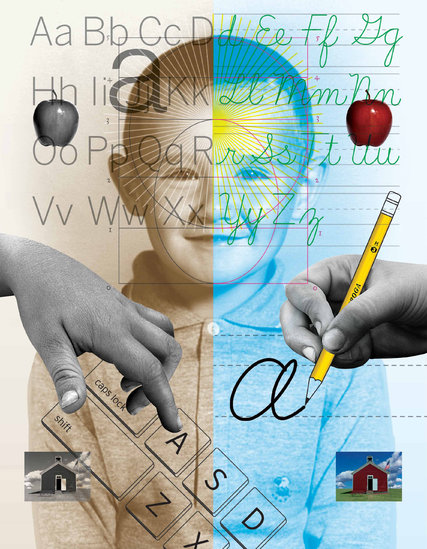
'Okay, I want to know the Straight Dope on why dry-erase marker boards are "taking over" and the traditional slate style chalkboards seem to be going to the wayside. One used to be able to buy a chalkboard at office supply stores, but now, they are all stocking only dry-erase marker boards. snarl...
I love old-fashioned chalkboards. They are fun, attractive, last virtually forever, and are easier to clean. Chalk is extremely inexpensive as well. Ahhh, I remember the good ole days as a kid in elementary school, always eager to volunteer to wash the chalkboards after school, pounding the immense clouds of dust out of the erasers, wheeeeee!
I do not care for marker boards. I find them unsightly, and they seem difficult to clean. The appropriate dry-erase ink often leaves permanent stains on them. aaaack... I have nothing nice to say about marker boards.
I don't really have an immediate need or use for chalkboard or markerboard, but I am very curious about the whole thing, nonetheless.
also: Are traditional chalkboards still being used in contemporary schools? I haven't set foot in a school classroom in over a decade.'
By MagicSilverKey on 14th August 2001
It was in about the late 1950s or early 1960s that the whiteboard was invented, but it took roughly another 30 years for them to become popular. I'm sure between that time, statements like the one above by MagicSilverKey were not uncommon. Harking back for the good old days. Now in 2016, in the educational establishments that I am used to, statements like that seem quite ridiculous. I'm not sure if you would hear any comments, questions or statements regarding the feasibility or the advantages/disadvantages of the whiteboard over the blackboard (or chalk board). It's no longer a question. That discussion has been had, for the most part anyway (The Washington Post, Stonehouse Designs, Science Blogs).
But...
- Details
- Read Time: 7 mins

Figuring out the right technology tools to use for your particular lesson can be a real problem, especially when there is so much out there and so little real guidance. So for those teachers who want to start doing more tech integration in their classes, what do you do? How do you start?
The answer is SAMR!
- Details
- Read Time: 4 mins

?????????????????????????????????????????? ?????????????????????
"A Learning Secret: Don't Take Notes with a Laptop" ??????
"Why Using Pen And Paper, Not Laptops, Boosts Memory" ?????????????
"Why You Learn More Effectively by Writing Than by Typing" ???????
?????????????????????????????????????????? ?????????????????????
?????REALLY?????
You don't really have to go far to find articles, websites and other pieces of information that state that handwriting is better for learning. When compared to typing, where the brain interprets the different letters with the same finger motion, handwriting which is distinctly different for each letter, holds more sway on remembering and analysing. I get it. It makes sense.
What does that mean for secondary education? Does it mean that the more writing students do, the more they learn? Or that if they go a lesson without writing, then the learning is not optimal? What does it mean for computer science classes and ICT classes, or using computers (in whatever form) for your history class or mathematics lesson? Do we then have to somehow squeeze writing in there? I'm not quite sure it's as simple as that.
- Details
- Read Time: 7 mins
Read more: The Typing vs Handwriting Debate: Looking at Secondary Education

Computer rooms are like a different environment in schools. It seems like being in front of a computer brings out a certain behaviour in students that you don't see in other classes, for some students anyway. I've often wondered why that is. I guess part of that would have been down to me, and my behaviour management skills over the years (or lack thereof). However, when observing other teachers, I've seen the same thing. They come into the computer room and they feel comfortable playing around, going on sites they know they shouldn't, not listening to the teacher etc...Why is that?
- Details
- Read Time: 8 mins
Read more: Three Reasons Why Computers Can Be Tough To Teach With
![]()
In my previous post Tech Use Part 1, I talked about all the reasons I could find and think of for people to use technology in the classroom. However, there are a considerable number of teachers that still do not use it. In this post, I cover the reasons why. Some of these reasons, similar to the previous article, have come from a collection of blogs and websites I found through research, which are all available at the bottom of the post. With these reasons, I have added possible solutions or statements which help rationalise and overcome the issues.
- Details
- Read Time: 17 mins
![]()
I initially intended to write a blog article about reasons why all teachers should be using technology in their classrooms. However, the more I researched, the more I not only saw plenty of blogs like that already, but lots of articles stating why teachers were not using technology, which I found more interesting (and is part of my PhD research). So I thought I would address both points, reasons to use technology in this post, and reasons why teachers don't use technology (and ways to overcome this) in the next blog post. As a computer science and ICT teacher, I have used technology for a majority of my teaching so I am totally biased here. As a result I have based most of what I've put in this article on what I've read from other blogs, the links of which you will be able to find at the bottom.
Teachers will not be replaced by technology, but teachers who don't use technology will be replaced by teachers who do.
-Sheryl Nussbaum-Beach
- Details
- Read Time: 8 mins
Read more: Tech Use - Part 1: 21 Reasons To Use Technology in the Classroom
With the introduction of Learning management systems and Virtual Learning Environments, education has been changed. The availability and use of dynamic resources as well as the deployment and receipt of instructions and assignments makes the learning process much easier. Not to mention the affect on the environment on saved printing, paper, trees if used properly.
- Details
- Read Time: 3 mins